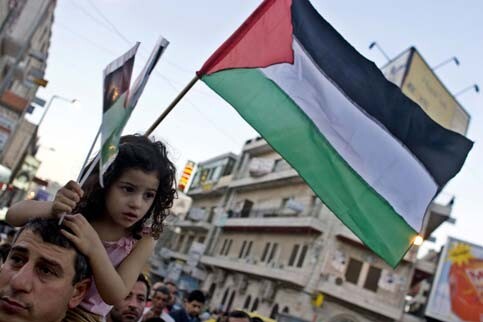United Nations News Service 28 June 2006

Palestinian children attending a rally against the attack on Gaza Strip in the West Bank city of Ramallah, June 29, 2006. (MaanImages/Raoul Kramer)
VIENNA — As the United Nations International Meeting in Support of Israeli-Palestinian Peace entered its second day with events on the ground increasingly drawing world attention, participants considered the peace process and challenges ahead, hearing expert views about the “catastrophic” developments in the Gaza Strip, and the critical need to renew the peace negotiations and strictly uphold international law and United Nations resolutions.
The two-day meeting brought together internationally renowned experts, including Israelis and Palestinians, representatives of UN Member States and observers, parliamentarians, representatives of the United Nations system and other intergovernmental organizations, the academic community, and representatives of civil society and the media to examine the state of the conflict and consider ways to put it back on the track towards a negotiated settlement.
The former Prime Minister of the Netherlands, Andreas Van Agt, said the record was appalling with respect to implementation of the Advisory Opinion of the International Court of Justice (ICJ) concerning Israel’s construction of the separation wall. In flagrant violation of the Court’s ruling — a ruling that had been requested by the General Assembly — Israel had not dismantled the wall and was steadily expanding it, causing more damage to the Palestinians living in the area. Settlements in the West Bank and East Jerusalem had not been removed, but had hurriedly been enlarged, and the occupation continued unabated. That was the “shocking picture of boundless disrespect for international law”.
The Palestinian people had been told repeatedly that they must not resort to violence, he said. Israel had brushed aside the ICJ ruling, as had the United States and the Europeans and others. All those countries that had dismissed the ruling had no moral ground on which to lecture Palestinians to renounce violence, for they themselves had disregarded a ruling of the highest Court. Some had argued that the ruling had been advisory and was, therefore, not binding. But the ICJ had concluded that the obligations violated by the wall’s construction were essentially imperative rules of international law, the existence of which could not be denied by any State. The time had come for the Assembly to put the matter before the Security Council, requesting it to compel Israel to abide by its resolution affirming the ruling.
The head of the Political Committee of the Palestinian Legislative Council in Ramallah, Abdullah Abdullah, stressed that third-party intervention should be based on international law and United Nations resolutions, as well as on the Advisory Opinion of the ICJ on the building of the separation wall. After receiving a ruling by the Court that the wall’s construction was illegal, Israel continued unabated to infringe on the rights of Palestinians, not by separating Palestinians from Israelis, but by separating Palestinians from Palestinians. Israel was gradually deteriorating into an apartheid regime, building roads for use by Israelis only; separate roads were built for the Palestinians. The culture of peace did not start from “the barrel of the gun”. It flowed from a mutual recognition that all people were human beings, first and foremost, and able to live with each other in peace and harmony.
Colette Avital, Deputy Speaker of the Israeli Knesset from the Labour Party, said that many of her friends and colleagues had tried to dissuade her from coming to the Meeting, saying it was just another exercise in Israel-bashing. But, she was inclined to take advantage of any meeting where she might meet her Palestinian colleagues and search for ways to “get us out of this mess”. There had been some progress, at least in terms of changed attitudes. Several years ago, only 5 per cent of Israelis favoured the two-State vision, whereas now a full 70 per cent supported it. At the same time, however, developments on the ground had made that goal more difficult to achieve. The results of the last Palestinian elections, having been democratic, should be respected, but many Israelis and Palestinians had seen the result as a setback. No one knew if and when there would be a change in attitude among the Hamas, so it was felt that the elections had taken the situation back to “square one”.
Asserting that the creation of the Palestinian state was unique, in that it was supposed to be created under occupation, without control of its borders or airspace, with its citizens subjected to the control of an occupying country, Harald Haas, Senior Researcher, Institute for Strategic Research, Austrian National Defence Academy, urged world and regional leaders to rethink their traditional strategies and methods of conflict management. No one doubted that the best solution would be a mutually negotiated final status agreement guaranteeing Israel its security needs, and creating a sovereign, independent and economically viable Palestinian state, guaranteed by the international community. But, collective trauma on both sides, transferred from generation to generation, had impeded the peace negotiations since 1992. A psychological understanding of the conflict would create the possibility of finding a political framework that suited the respective peoples and their history.
The conference will meet again at 3 p.m. to continue its thematic debate and consider a final document with which to close the session.